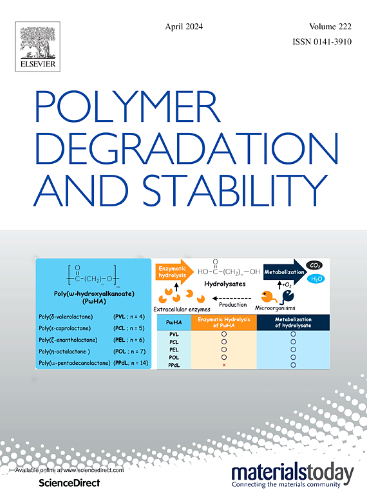Sustainable, degradable and malleable low-dielectric-constant thermosets derived from biomass for recyclable green electronics
IF 6.3
2区 化学
Q1 POLYMER SCIENCE
引用次数: 0
Abstract
In view of their excellent thermal and chemical resistance, favorable adhesion properties, high tensile strength, and other advantages, epoxy thermosets have numerous industrial applications such as coating, adhesive, and composite material production. However, bisphenol A (BPA)-based resins, which account for a significant fraction of the above thermosets, adversely affect human health by interfering with the normal functioning of the endocrine system and cannot be easily decomposed and recycled. Herein, degradable and sustainable bio-based epoxy thermosets with crosslinked network structures are prepared by the epoxidation of isosorbide with epichlorohydrin and the curing of the produced isosorbide diglycidyl ether (ISDGE) with cyclic lactones through a cationic ring-opening reaction. The ISDGE thermosets fully decompose into soluble and recyclable products under mildly basic conditions within three days, which is ascribed to the presence of ester moieties within the polymer network structure. Compared to a representative BPA-based epoxy, ISDGE-based thermosets exhibit lower dielectric constants and are more flexible. Moreover, the glass fibers in ISDGE-based prepregs can be fully recovered after on-demand degradation. Thus, our work provides promising eco-friendly alternatives to conventional epoxy thermosets and paves the way for the reduction of plastic waste generation and the development of recyclable green electronics.
求助全文
约1分钟内获得全文
求助全文
来源期刊

Polymer Degradation and Stability
化学-高分子科学
CiteScore
10.10
自引率
10.20%
发文量
325
审稿时长
23 days
期刊介绍:
Polymer Degradation and Stability deals with the degradation reactions and their control which are a major preoccupation of practitioners of the many and diverse aspects of modern polymer technology.
Deteriorative reactions occur during processing, when polymers are subjected to heat, oxygen and mechanical stress, and during the useful life of the materials when oxygen and sunlight are the most important degradative agencies. In more specialised applications, degradation may be induced by high energy radiation, ozone, atmospheric pollutants, mechanical stress, biological action, hydrolysis and many other influences. The mechanisms of these reactions and stabilisation processes must be understood if the technology and application of polymers are to continue to advance. The reporting of investigations of this kind is therefore a major function of this journal.
However there are also new developments in polymer technology in which degradation processes find positive applications. For example, photodegradable plastics are now available, the recycling of polymeric products will become increasingly important, degradation and combustion studies are involved in the definition of the fire hazards which are associated with polymeric materials and the microelectronics industry is vitally dependent upon polymer degradation in the manufacture of its circuitry. Polymer properties may also be improved by processes like curing and grafting, the chemistry of which can be closely related to that which causes physical deterioration in other circumstances.
 求助内容:
求助内容: 应助结果提醒方式:
应助结果提醒方式:


